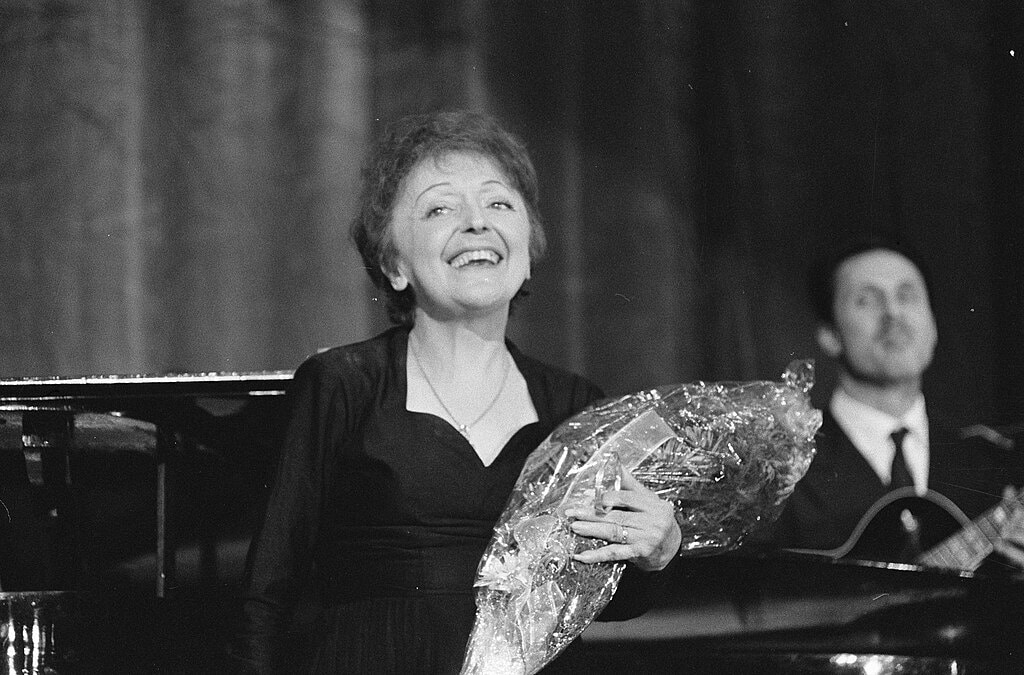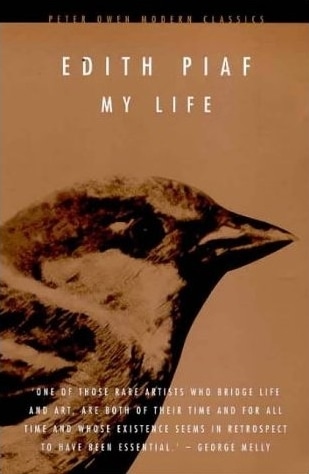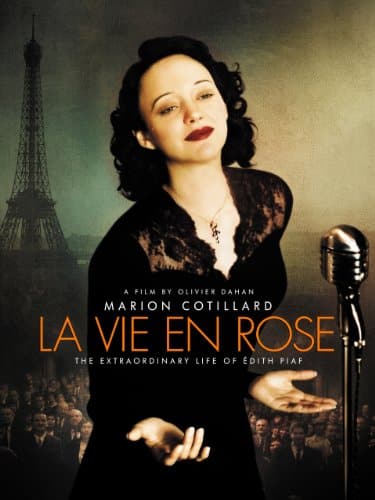Contents
Learn French with Edith Piaf

Cobblestone streets, flowers in bloom, the scent of fresh baguette wafting out from the boulangerie (bakery). “La vie en rose” playing dreamily in the background. Who among us hasn’t envisioned Paris in this way?
Fortunately, you can have a piece of this dream no matter where you are through the beloved Edith Piaf. Here are some different ways you can practice your French with Edith Piaf, and why you should consider doing it.
Download: This blog post is available as a convenient and portable PDF that you can take anywhere. Click here to get a copy. (Download)
1. Read “Ma vie” (“My Life”)
“Ma vie” is Edith Piaf’s autobiography and it tells her story the way she remembered it towards the end of her life—and the way she wanted others to know it.
Reading in French is an important component of learning the language, but what you read is very much up to you.
Personally, I don’t see what could be more interesting than Piaf’s telling of her own life, which goes into the gritty details of the extraordinary events that both preceded and followed her fame.
Published posthumously in 1964, “Ma vie” tells of how Piaf was abandoned by her parents and raised in a brothel, overcame blindness as a child, went from singing on the streets to international fame, lost her only child, survived several serious car accidents, struggled with substance abuse and had many lovers, one of whom died in a plane crash while coming to visit her.
Her personal narrative shows how she was able to work through these difficult times and how these events shaped both her and her music.
Expect to learn a wide range of vocabulary, as Piaf’s story broaches a large variety of subjects, some of them hard to believe.
Reading this book will also help you practice your French past tense, as she recalls many stories from her life. Get ready to test your le passé composé and l’imparfait skills!
Additionally, you’ll benefit from a French cultural lesson, as Piaf takes you through life on the streets of Paris and references many other French celebrities in a way that’s super interesting and fun to read.
2. Listen to “La vie en rose” (“Life in Pink”)
Undoubtedly one of her most famous songs, “La vie en rose” is a charming love ballad about seeing life through rose-colored lenses whenever one’s in the arms of her lover—ooh la la, quelle romance (what romance)!
French learners are in luck, as Piaf always sang with impeccable enunciation.
This makes her singing easier for newbies to understand, but lyrics are there in case you need them. For more guidance on the lyrics, the interactive subtitles on FluentU’s music videos and other French clips come with annotations like definitions, example sentences and other helpful info.
This song contains mostly basic vocabulary that’s great for beginners, such as la vie (life), l’amour (love), le bonheur (happiness) and un rire (a laugh).
However, more intermediate-level lessons are present as well, such as how to form possessive adjectives and pronouns like mon cœur (my heart), ses bras (his arms), sa place (its place) and les miens (mine).
Finally, this song is truly one of the best for all learners as it’s very repetitive, giving you plenty of opportunities to hear new vocabulary and learn the correct pronunciation of each word.
You can take a look at the lesson below from our YouTube channel for a full grammar breakdown of the song:
3. Listen to “Non je ne regrette rien” (“No, I Don’t Regret Anything”)
“Non je ne regrette rien” is Piaf’s other sensational song whose fame rivals that of “La vie en rose.” It’s also one of her most powerful ones, boldly stating the notion that she regrets nothing from her life but rather embraces both the good and the bad.
This song has long been a staple for learning all about French negatives, as you’ll hear a million different ways to say “no,” such as non (no), ni… ni (neither… nor), ne… rien (nothing) and ne… plus (no longer).
During this song, you’ll learn how to form negative phrases using the simplest constructions, as in “je ne regrette rien” (“I don’t regret anything”) where the negative components ne and rien are wrapped around the verb regrette.
You’ll also be exposed to other, higher-level negative constructions like “ni le bien…ni le mal” (“neither the good nor the bad”), giving you a pretty well-rounded lesson.
Aside from a crash course in negatives, this song will make you an expert in the passé composé, a French past tense mentioned earlier in this post and used to refer to actions that have a definitive end.
For example, Piaf sings, “C’est payé, balayé, oublié” (“It was paid, swept, forgotten”).
Lastly, this song is largely made up of words that start with or contain the letter “r.”
Just try and say the main part of the refrain, “rien de rien, non je ne regrette rien” (“nothing at all, no, I don’t regret anything”)—what a mouthful!
As such, you’ll get to practice perfecting the French “r” sound that seems to elude so many learners and tends to be one of the harder sounds for non-native speakers to master, as it’s nothing like the English “r.”
4. Listen to “L’hymne à l’amour” (“Hymn to Love”)
“L’hymne à l’amour” is yet another one of Edith Piaf’s fabulous masterpieces in which she declares her devotion to her beloved, saying that she would essentially do anything he asked her to and that she can’t live without him.
This song is particularly great for learning the French conditional and is chock-full of examples like j’irais (I would go), je ferais (I would do) and je renierais (I would deny), just to name a few.
Not only will you practice conjugating in the conditional, like in the examples above, but you’ll also learn how to use it correctly.
In other words, the conditional tense is used in conjunction with the past tense l’imparfait, like in Piaf’s line, “Je me ferais teindre en blonde/Si tu me le demandais” (“I would cut off my blond hair/If you asked me”).
The second valuable French lesson you’ll get is when and how to use direct object pronouns, of which this song has many. Some examples include tu me le demandais (you asked me), la vie t’arrache (life tears you) and tu m’aimes (you love me).
Really, this song has a lot to offer!
5. Consider Watching “La vie en rose” (the Film)
Last but certainly not least is the beautiful film directed by Olivier Dahan and released in 2007 detailing the ups and downs and the intricacies of Edith Piaf’s life.
Actress Marion Cotillard starred as Piaf and became the first-ever Oscar winner for a French-language role because of her phenomenal acting in this film.
“La vie en rose” (the film) is a great way to learn more about Piaf and practice your French at the same time.
During the film, you’ll be exposed to many of the great French songs that made her so famous, and you’ll also be getting a chance to practice your dialogue and listening skills.
The film’s available for rent or purchase on Amazon and comes with the bonus of optional English subtitles.
FluentU takes authentic videos—like music videos, movie trailers, news and inspiring talks—and turns them into personalized language learning lessons.
You can try FluentU for free for 2 weeks. Check out the website or download the iOS app or Android app.
P.S. Click here to take advantage of our current sale! (Expires at the end of this month.)
Why Learn French with Edith Piaf?
For foreigners and native French alike, Edith Piaf will forever be a defining part of France’s cultural identity.
One of the most famous French singers of all time, Piaf has never ceased to hold the spotlight since her debut as a cabaret performer in 1930s Paris.
Her ballads are among the most widely known French songs and are sung all over the world, featured in plenty of films and adored by all generations.
Mostly centered around loss and love, her songs reflect the many hardships she endured throughout her very complicated and somewhat tragic life.
Apart from the beautiful lyrics in her songs, Piaf is remembered for the depth and force of her voice and the manner in which she sang with pure and raw emotion.
Who wouldn’t love to have such a powerful icon as their personal French teacher?
Although Piaf is sadly no longer with us, her music and story remain, as do the many French lessons they carry.
Sit back and enjoy the following diverse resources available for learning French with Edith Piaf!
Edith Piaf is a stunning French icon and her story is a most fascinating one.
Learning about her life through songs, books and films is a super interesting way to learn French and I promise you that, if you do, you will ne regrette rien!
Download: This blog post is available as a convenient and portable PDF that you can take anywhere. Click here to get a copy. (Download)
And One More Thing...
If you like learning French at your own pace and from the comfort of your device, I have to tell you about FluentU.
FluentU makes it easier (and way more fun) to learn French by making real content like movies and series accessible to learners. You can check out FluentU's curated video library, or bring our learning tools directly to Netflix or YouTube with the FluentU Chrome extension.
One of the features I find most helpful is the interactive captions—you can tap on any word to see its meaning, an image, pronunciation, and other examples from different contexts. It’s a great way to pick up French vocab without having to pause and look things up separately.
FluentU also helps reinforce what you’ve learned with personalized quizzes. You can swipe through extra examples and complete engaging exercises that adapt to your progress. You'll get extra practice with the words you find more challenging and even be reminded you when it’s time to review!
You can use FluentU on your computer, tablet, or phone with our app for Apple or Android devices. Click here to take advantage of our current sale! (Expires at the end of this month.)













